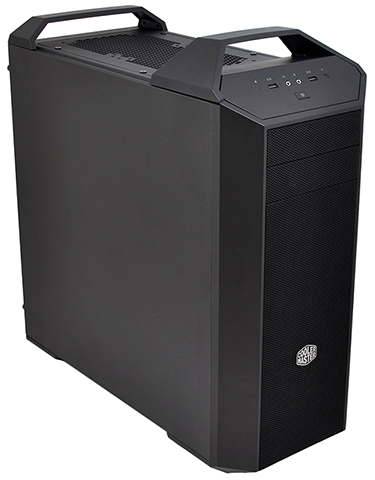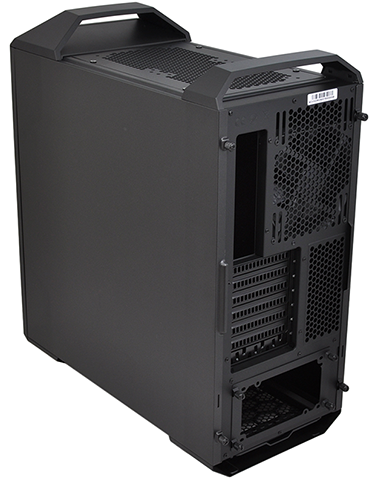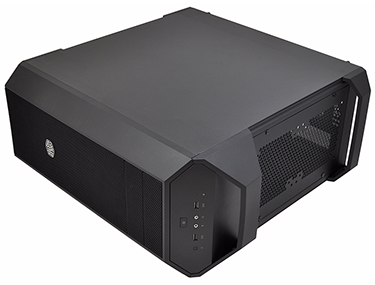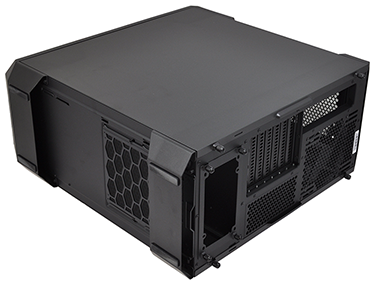Introduction
Modular gadgets are the Holy Grail of the tech world. The idea that you could take the parts you most care about and put together a tailor-made device that's perfect for your needs carries obvious attraction, but the concept is often too good to be true and, after the initial excitement, modular hardware typically ends up being either too expensive or too ambitious, or both.
The modular Mini Lego computer and Project Ara smartphones are good examples of concepts that sound fantastic but have plenty to prove, and in the PC chassis arena, modular designs usually fall flat from the get-go. Razer's Project Christine never got going, and who still remember's the ill-fated Antec Lanboy Air?
It's a precarious business, so when Cooler Master told us it had made "the ultimate modular case," our immediate reaction was one of "uh oh". But having spent some time playing with the new chassis, we've discovered that it's different from all those who have failed because, well, this one succeeds.
It's called the MasterCase 5 and, let's be honest here, Cooler Master succeeds not by cracking the modular formula, but rather by taking a fast-and-loose approach to what our perception of modular hardware actually is. If you're expecting a fully configurable enclosure that can transform in size and shape to suit your needs, you're out of luck. What we have instead is a more traditional mid-tower frame that has a few modular bits that allow for a certain level of customisation.
That's a pretty good compromise, and one that's helped by the fact that the MasterCase 5's core tower is a solid starting point. Measuring 235mm x 548mm x 512mm in size and finished with an attractive matte-black coating, the case appears bold but not brash, chunky yet sleek, and works well as a modern take on a classic form factor.
Build quality is good, with the steel body carrying only a few plastic accents, and Cooler Master's aesthetic simplicity is what gives the MasterCase 5 its charm. The enclosure should suit users seeking a mid-tower that appears more grown-up than most, and it has a sort-of industrial look and feel about it. We like the handles on top, the mesh front does a good job of streamlining two 5.25in bays, and there's nothing cluttering the tidy exterior.
If there's a criticism, it's that we aren't particularly keen on the I/O panel. Angled at the top-front edge, it includes two USB 3.0 ports, a pair of audio jacks as well as the customary power and reset buttons. Everything you'd expect, and port positioning works well, but the ports sit in a large panel that ends up looking a little too sparse. The power button in particular appear strangely out of place, and though everything works as intended, we reckon this is one area in which the MasterCase 5 could be given a more premium look and feel.
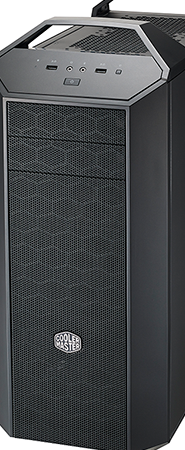 |
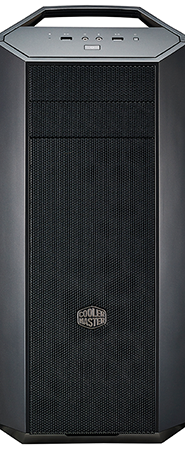 |
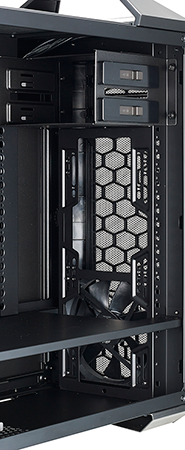 |
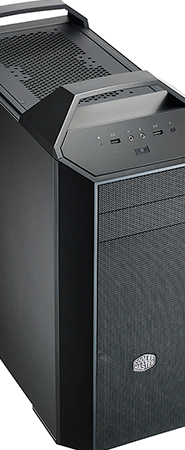 |
Perusing the rest of the exterior doesn't reveal a lot. A perforated section in the top panel hints at room for additional fans, and though it's good to see this area filtered as standard, it's a shame the filter isn't easily removable. What we have is essentially a two-layered section consisting of the metal bodywork sat atop a thin filter. Both are fixed onto the chassis' frame using four screws, and these need to be undone if you want to give the mesh filter a thorough clean.
Maintenance is a whole lot simpler at the front, where the large filtered panel pulls away without the need for tools, and likewise on the bottom of the case, where a dust filter sits beneath the PSU bay and slides out with no fuss. Four full-width feet help prop-up the chassis' base around 35mm from the ground, and rubber pads help soak up vibration. Around the sides, a pair of thumb screws hold each side panel in place, and it's interesting to note that the panels are notched only on the bottom. This makes removing and reattaching nice and simple, however the tops of the side panels aren't fully fixed, meaning there is a risk of bulging if your cables aren't tidy.






